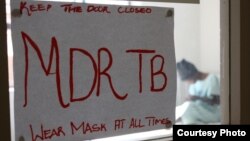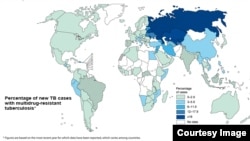GENEVA —
The World Health Organization reports tens of thousands of people with the multidrug-resistant form of tuberculosis are now getting treatment for this disease thanks to new diagnostic tools. In advance of World TB Day on March 24, WHO says a project started five years ago is making progress in diagnosing MDR-TB patients who formerly were missed.
The World Health Organization says nearly 500,000 people worldwide fell ill with multidrug-resistant tuberculosis in 2012. Yet, fewer than one in four of these people were diagnosed, mainly because they did not have access to the proper diagnostic services.
Five years ago, the World Health Organization and several partner agencies started a project in 27 low and middle-income countries in an effort to reach people with MDR-TB who are falling through the cracks of their countries' health systems.
'EXPAND-TB' project
The director of WHO’s Global TB Program, Mario Raviglione, says the project, known as EXPAND-TB, has made progress in ferreting out many of these missed patients. He notes more than 70,000 new cases of MDR-TB were discovered in the 27 countries in 2012.
“In 2008, that was a year before we started the project, these 27 countries only reported about 10,000 MDR-TB cases," said Raviglione. "By 2012, the number of MDR-TB cases that were notified by these countries tripled. In India, for instance, and this probably one of the best examples, this is the largest recipient of EXPAND-TB support, 16,000 people with MDR-TB were detected in 2012 with support from, again, this project. It used to be four or 5,000. So, you know, it really increased dramatically.”
The 27 countries involved in the project, including 12 from Africa, are found in all regions of the world. Together, they carry 40 percent of the estimated global MDR-TB burden.
The global health initiative known as UNITAID is providing $87 million to support EXPAND-TB. Another organization called FIND is the main implementing partner.
Additional funding needed
Chief Executive Officer of FIND, Catharina Boehme, says diagnostics influences about 70 percent of health care decisions. Yet, she adds, only three to five percent of health care spending goes for diagnostics.
She says traditional diagnostic tests for TB can take more than two months to get results. However, she notes new technologies now make it possible to rapidly diagnose TB and drug-resistant TB in as little as two hours.
“In addition to the immediate benefit to patients, EXPAND-TB also, however, has created or has paved the way to the uptake and rapid uptake of future diagnostic tests… FIND is currently aiming to address in collaboration with multiple R&D partners the most urgent needs," said Boehme. "A rapid TB test for testing at community levels to cut transmission and a rapid test for extended drug resistance detection will be crucial also for the uptake of new drugs that are in the pipeline.”
Tuberculosis is contagious and spreads through the air. South Asia and Africa account for nearly two-thirds of all missed cases.
Most people can be cured of regular TB by taking a six-month course of drugs at a cost of around $30.00. In comparison, it takes about two years to treat people with MDR-TB.
WHO says the complex regimen of drugs needed to treat the disease can run into tens of thousands of dollars in wealthy countries. However, negotiations with pharmaceutical companies have reduced the cost of these drugs to around $1,800 for patients in developing countries.
The World Health Organization says nearly 500,000 people worldwide fell ill with multidrug-resistant tuberculosis in 2012. Yet, fewer than one in four of these people were diagnosed, mainly because they did not have access to the proper diagnostic services.
Five years ago, the World Health Organization and several partner agencies started a project in 27 low and middle-income countries in an effort to reach people with MDR-TB who are falling through the cracks of their countries' health systems.
'EXPAND-TB' project
The director of WHO’s Global TB Program, Mario Raviglione, says the project, known as EXPAND-TB, has made progress in ferreting out many of these missed patients. He notes more than 70,000 new cases of MDR-TB were discovered in the 27 countries in 2012.
“In 2008, that was a year before we started the project, these 27 countries only reported about 10,000 MDR-TB cases," said Raviglione. "By 2012, the number of MDR-TB cases that were notified by these countries tripled. In India, for instance, and this probably one of the best examples, this is the largest recipient of EXPAND-TB support, 16,000 people with MDR-TB were detected in 2012 with support from, again, this project. It used to be four or 5,000. So, you know, it really increased dramatically.”
The 27 countries involved in the project, including 12 from Africa, are found in all regions of the world. Together, they carry 40 percent of the estimated global MDR-TB burden.
The global health initiative known as UNITAID is providing $87 million to support EXPAND-TB. Another organization called FIND is the main implementing partner.
Additional funding needed
Chief Executive Officer of FIND, Catharina Boehme, says diagnostics influences about 70 percent of health care decisions. Yet, she adds, only three to five percent of health care spending goes for diagnostics.
She says traditional diagnostic tests for TB can take more than two months to get results. However, she notes new technologies now make it possible to rapidly diagnose TB and drug-resistant TB in as little as two hours.
“In addition to the immediate benefit to patients, EXPAND-TB also, however, has created or has paved the way to the uptake and rapid uptake of future diagnostic tests… FIND is currently aiming to address in collaboration with multiple R&D partners the most urgent needs," said Boehme. "A rapid TB test for testing at community levels to cut transmission and a rapid test for extended drug resistance detection will be crucial also for the uptake of new drugs that are in the pipeline.”
Tuberculosis is contagious and spreads through the air. South Asia and Africa account for nearly two-thirds of all missed cases.
Most people can be cured of regular TB by taking a six-month course of drugs at a cost of around $30.00. In comparison, it takes about two years to treat people with MDR-TB.
WHO says the complex regimen of drugs needed to treat the disease can run into tens of thousands of dollars in wealthy countries. However, negotiations with pharmaceutical companies have reduced the cost of these drugs to around $1,800 for patients in developing countries.





